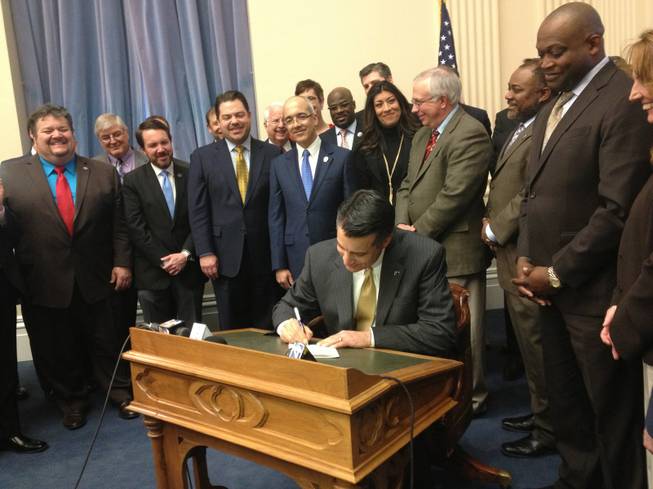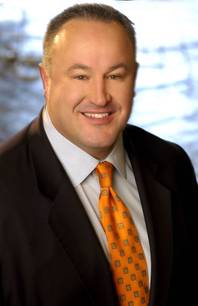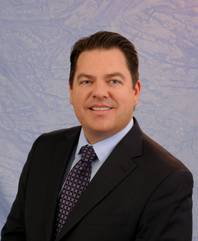
Surrounded by Nevada legislators, Gov. Brian Sandoval signs an online poker bill into law, Thursday, Feb. 21, 2013. The law will allow Nevada to move ahead with online poker in the absence of federal action.
Sunday, March 3, 2013 | 2 a.m.
When Gov. Brian Sandoval signed the online gambling bill in the old Assembly chambers last month, he reminisced about the 1931 “Wide Open Gambling” bill, which was signed in the same room.
But the law Sandoval signed does not open the floodgates for online gambling; it cracks the door a smidgen and ushers in the usual big names to the exclusive, new online gambling club.
The Nevada Resort Association, representing gaming’s largest businesses, won big with the new law after a slow, dozen-year push to ensconce protections for big casinos in online gaming laws and regulations.
Tech companies, software developers and entrepreneurs have no choice but to grab onto the coattails of major resort hotels if they want to participate in any of the interstate online gaming compacts the law authorizes.
“I don’t want a fly-by-night individual to be able to open an online gaming site,” said Assembly Majority Leader William Horne, D-Las Vegas, who sponsored the bill with Sandoval.
But even major tech companies eager to join the new market would have to partner with a resort hotel company if they want a piece of the market in Nevada.
“You’re literally excluding just about everyone who could actually come in and make high-quality gambling apps for online gamblers to play,” said Travis Skweres, a web and mobile developer for a startup company in California.
The law requires a $500,000 operating license to enter the online gambling market and restricts licenses largely to resort hotels -- a legal definition including 200 hotel rooms, a 24-7 restaurant, a bar and a casino floor-- with a nonrestricted gaming license.
The web, of course, requires no such space for the operation of gambling apps or websites.
But that’s not the issue.

Lobbyist Pete Ernaut
“We have companies in Nevada that have invested billions of dollars in the state,” said Pete Ernaut, lobbyist for the Nevada Resort Association. “We want to make sure we don’t create undue competition. ... It’s a very important restriction.”
In New Jersey, which passed its own online gambling law this week, only Atlantic City casinos can get in the game.
The arguments for such restrictions generally run along these lines:
• Existing casinos are trusted, legal operators with a sophisticated understanding of gambling regulations.
• Resort hotels offer big, widely known brands that serve as a springboard to success for online gambling partnerships.
• It is important to exclude gaming companies that profited from illegal online gaming from 2005-11. Including those companies would give them an undeserved edge in the new market.
• Online gambling is new and does not yet have full federal backing, so it’s important to establish a credible standard with a restricted market of credible operators.
But not everybody is happy.
“The Nevada Resort Association once again found an avenue to squeeze small gamers out of an opportunity for everyone,” said a Northern Nevada gaming operator who doesn’t qualify to enter the online gambling world under the new law.
The Nevada Policy Research Institute, a free-market think tank, said the new law is protectionist.
“It would have been ridiculous if government restrictions prohibited the entrepreneurs who founded eBay from doing so unless they first constructed physical department stores,” said Geoffrey Lawrence, deputy policy director for NPRI. “The entire premise of the Internet is that this physical space isn’t necessary and that the most innovative entrepreneurs can succeed.”
The law passed as an emergency measure in less than a day, giving legislators scant time to review the language. The Reno Gazette-Journal reported Assemblyman Ira Hansen, R-Sparks, was concerned about the “little guy," but even he voted for the bill.
While Ernaut, Sandoval and Horne shepherded the bill through a joint Senate and Assembly committee in one morning, the resort association’s victory was years in the making.
It began dramatically in 2001.
An online gaming bill had died in the Senate after Sen. Joe Neal, D-North Las Vegas, made it known that he would offer amendments that would raise gambling taxes.
Legislators, seeking to avoid a lengthy debate and a recorded vote on tax increases, let the bill quietly die, only to resurrect it on the 119th day of the 120-day legislative session.
Senators who had voted for the online gaming bill in committee stripped and gutted a bill from Assemblywoman Sheila Leslie, D-Reno, that had a peripheral connection to gaming.
They took the skin of Leslie’s bill, stuffed the carcass of the dead online gambling bill inside, and reanimated the online gambling proposal.
Because a conference committee proposed the language, legislators could only vote ‘yes’ to adopt it or ‘no’ to reject it. Gaming lobbyists and legislative allies had gotten around Neal; he would not be able offer his gambling tax amendments.
The bill sailed out of the Assembly and onto the Senate floor on the last day of the legislative session.
Neal was predictably unhappy, arguing the legislative process had been hijacked.
Sen. Mark James, who was chairman of the Senate committee that originally passed the bill that later died, argued the basic policy in the new bill had been publicly vetted earlier.
Regardless of the procedure, Sen. Terry Care, D-Las Vegas, asked the Legislature not to adopt the language because it was akin to the government requiring Amazon.com to first open a brick-and-mortar bookstore before selling books online.
“The arguments that you are going to hear is that the investment of one or two exclusive resorts must be protected,” he said. “I do not agree with that. There is nothing that says the Legislature has a duty to protect an investment. The marketplace does that.”
James argued that Nevada had a good product to sell on the market, and it should not loosen its regulations for the benefit of buyers who have no stake in Nevada.
“If you want to take advantage of the best gaming regulatory body and be able to assure those people who might be coming to your website to gamble that they are gambling with an honest company, with someone who has high integrity, then you can come to Nevada under certain conditions,” he said. “Those conditions are that you invest in our state.”
The bill passed the Senate 17-4 with Care, Neal, Sen. Bob Coffin, D-Las Vegas, and Sen. Mike Schneider, D-Las Vegas, in opposition.
Gov. Kenny Guinn signed the bill into law a week later.
“They didn’t want people swooping in from outside to do it with no proven track record,” said David G. Schwartz, director at the Center for Gaming Research at UNLV, of the 2001 decision. “With online gaming, they’d rather be too strict than too lenient.”
Since the major casinos in Nevada won in 2001, little has been said of the provision.

Sen. Michael Roberson
Sen. Michael Roberson, R-Las Vegas, noted in 2011 that the law precludes anyone who is “basically is not a resort hotel” from participating in the state’s online gaming market.
That’s almost correct. Although tech companies cannot go solo in Nevada’s system, they can contract with major casinos.
One example is the recently announced partnership between Eldorado Hotel Casino and game developer 3G Studios.
The law binds tech companies and tethers them to resort hotels but provides access where there would otherwise be none under the law.
Still, Lawrence said it would be reasonable to require online gaming companies to abide by the same strict regulatory criteria as resort hotels to protect against fraud and ensure that Nevada puts its stamp of approval only on reliable companies.
But the law as written now instructs state regulators only to license resort hotel operators, which can then contract with “service providers,” the tech companies that will actually make the online gambling interface.
“The bottom line is there’s clearly a legislative intent to who should have these licenses,” said A.G. Burnett, chairman of the Gaming Control Board, which is responsible for implementing the law.

Join the Discussion:
Check this out for a full explanation of our conversion to the LiveFyre commenting system and instructions on how to sign up for an account.
Full comments policy